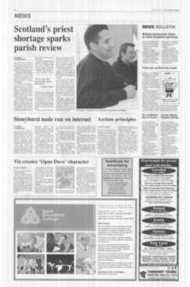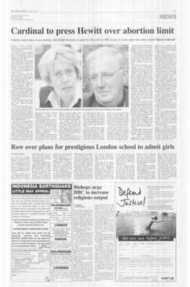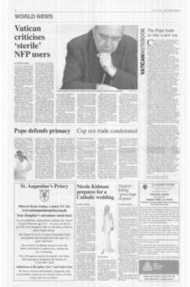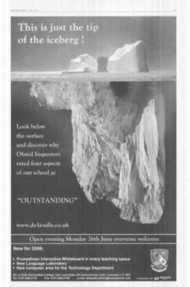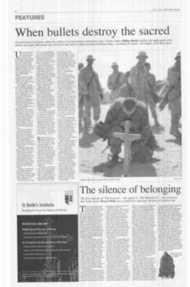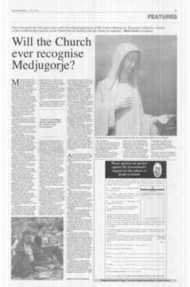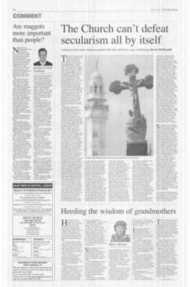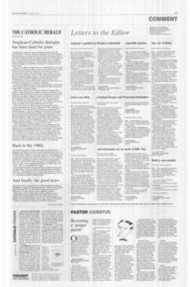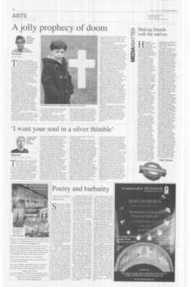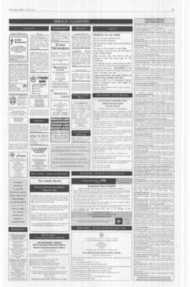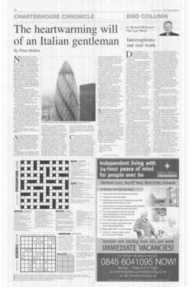Page 1, 16th June 2006
Page 1
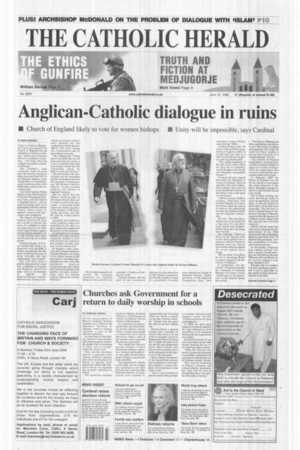
Report an error
Noticed an error on this page?If you've noticed an error in this article please click here to report it.
Tags
Share
Related articles
Anglican Unity Under Strain
Local Unity Urged After Lambeth Vote
Cardinal Warns Of 'spiritual Alzheimer's'
Meeting Rekindles Unity Hopes
Cardinal Cassidy: Are We Ready For Arcic Iii?
Anglican-Catholic dialogue in ruins
III Church of England likely to vote for women bishops • Unity will be impossible, says Cardinal
BY MARK GREAVES
CARDINAL CORMAC MurphyO'Connor has warned the Church of England that the ordination of women as bishops — which most observers believe is a foregone conclusion — will bring about the collapse of genuine ecumenical dialogue.
The Cardinal's stark comments, made 40 years after the historic meeting in Rome between Pope Paul VI and Michael Ramsey, then Archbishop of Canterbury, signal a growing crisis in the relationship between the two communions.
Last week Cardinal Walter Kasper, head of the Pontifical Council for Promoting Christian Unity, said the Church of England faced a "serious and long-lasting chill" in its relationship with the Catholic Church unless plans to appoint women to the episcopate were withdrawn.
The Church of England's General Synod will meet next month to discuss the issue. It is unlikely to reach any final decision, but there is now much broader support among Church members for women bishops than there was 20 years ago for women priests.
Cardinal Murphy-O'Connor insisted this week in an interview with the BBC's Sunday programme that the move would put the goal of unity between the two communions "out of reach".
This will have been a painful admission for a man who, as Bishop of Arundel and Brighton, served for many years as co-chairman of ARC1C, the Anglican/Roman Catholic International Commission, which envisaged organic unity between the two communions within decades. ARCIC still exists, though few commentators take its proceedings seriously.
The Cardinal said: "I think there is no doubt that we will more and more now exist, as it were, in parallel rather than converging towards the full communion which we believe is the will of Christ."
He stressed that "the relationship and the friendship and the cooperation between the Anglican Communion and the Roman Catholic Church" would continue whatever the Church of England's decision.
But he added that the Church "would be glad" if the General Synod chose not to ordain women to the episcopate — a move that would require two-thirds majorities in the Houses of Bishops, Clergy and Laity, just like the vote for women priests in 1992.
Unusually, the toughening of the Cardinal's stance was underlined by his staff in a press release that emphasised the gravity of the situation.
A spokesman for Cardinal Murphy-O'Connor said his comments marked a shift from his previous insistence that progress towards unity was "a road without exit".
In Sunday's radio interview, the Cardinal explained: "Cardinal Kasper was saying if you ordain women to the episcopate it will affect relationships not only within the worldwide Anglican Communion but also within the Church of England itself and also, of course, relationships with the Roman Catholic Church and with the Orthodox." The Cardinal repeated very closely the concerns expressed by Cardinal Kasper in his speech to an assembly of Anglican bishops last week.
Cardinal Kasper said the goal of true ecumenical dialogue was the restoration of full Church communion, but that this would no longer be a possibility if women were ordained as Church of England bishops. (Other provinces of the Anglican Communion have been ordaining women bishops since the late 1980s.) Cardinal Kasper said: "In terms of the possible recognition of Anglican orders, it would lead not only to a short-lived cold but to a serious and long-lasting chill.
"The shared partaking of the one Lord's table, which we long for so earnestly, would disappear into the far and ultimately unreachable distance."
Cardinal Kasper argued that while the ordination of women as bishops followed logically from their ordination as priests, the move was more significant because of the bishop's role as the agent of communion.
Catholic journalist Clifford Longley explained that Cardinal Murphy-O'Connor had always dune his utmost to improve the relationship between the Catholic Church and the Anglican Communion.
He said: "This has been a subject close to his heart for a long time. It is his life's work, and he must be heartbroken about the way things have moved."
He continued: "There are those in the Vatican who would have pulled out of relations with the Church of England years ago, but he has used his influence behind the scenes against those people.
"He has done everything he can to encourage Rome to remain engaged with the Church of England."
A spokesman for the Church of England said that the comments of Cardinal Murphy-O'Connor would "inform part of the discussion" at the General Synod next month. "The House of Bishops has been considering what advice to give the Synod, including arrangements that might be made for those unable to accept the oversight of a woman bishop," he said.
The Church of England established a working party in 2001 to decide whether to approve women bishops, with the expectation that women would join the episcopate within seven years.
In February 2005 the House of Bishops was told by the Synod to investigate the legal obstacles to the move, and then to present its advice to the General Synod next month.
But at their meeting last week the bishops failed to reach an agreement, and are likely to ask the Synod for more time to formulate their proposals. The decision to invite Cardinal Kasper to the bishops' meeting on Monday suggests that the question of whether to press ahead with the measure has not been resolved.
Efforts will be made this autumn to commemorate the anniversary of the 1966 meeting between Archbishop Ramsey and Pope Paul VI. despite disagreements over the consecration of women and homosexual men.
In November, Anglican and Catholic bishops will hold a historic formal meeting and Archbishop Rowan Williams will visit Rome for his second audience with Pope Benedict XVI.
Whether the two leaders will have anything constructive to say to each other on the subject of unity, however, remains to be seen.
Editorial Comment: Page 11
blog comments powered by Disqus



